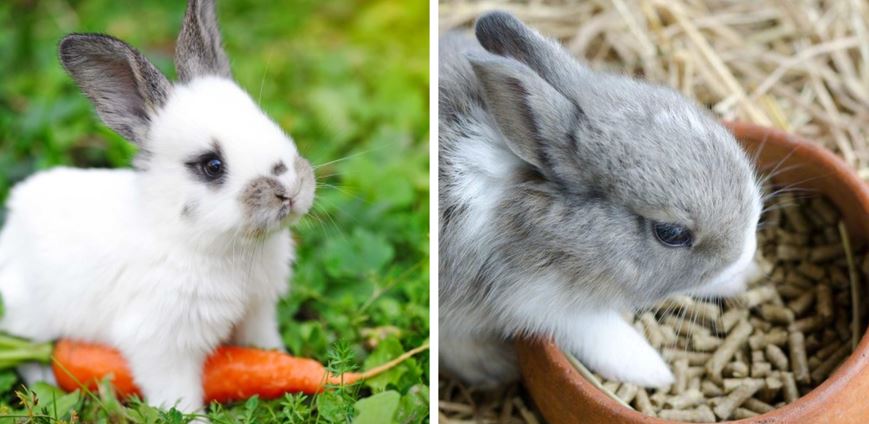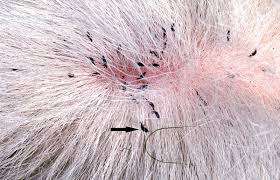What can rabbits eat?

Rabbits should be fed a diet of mainly hay. They are not picky creatures. You can give them a very wide variety of foods and they will eat them all. Below is a list of the best type of foods you can feed to your rabbit.
Rabbits have delicate gastrointestinal systems and are really effective at processing food. If you present brand-new foods too rapidly, or feed unsuitable food options, the bunny's typical digestion flora a.k.a normal bacteria, will be interrupted, toxin and gas-producing bacteria can get out of control, and the bunny might end up being really ill and may even die.
- Hay
- Pellets
- Veggies
- Beet greens
- Cabbage
- Beans
- Cauliflower
- Potatoes
- Chocolate
- Corn or corn-cob
- Cereal
- Iceberg lettuce
- Legumes
- Crackers
- Nuts
- Pasta
- Mustard greens
- Rhubarb
- Peas
- Sugar
- Seeds
- Yogurt
- Turnip greens
- Cucumber
- Bok choy
- Bell peppers
- Carrot tops
- Fennel
- Chard
- Spinach Kale
- Brussels sprouts
- Escarole
- Endive
- Cilantro
- Mint
- Parsley
- Sage
- Thyme
- Dill
- Basil
- Romaine Lettuce
- Green leaf lettuce
- Boston bibb lettuce
- Red leaf lettuce
- Arugula Lettuce
- Butter Lettuce

This is the staple of all rabbit's diet. The bottom of a rabbits diet pyramid would include long-stemmed plants. This makes up roughly 90 percent of most rabbit's diet.. Rabbits are grazing animals and require to have a limitless supply of fresh hay to munch on daily.
Alfalfa hay is not an excellent option for an adult bunny, considering that it is a legume and not a grass type, and as such is a bit too rich to be eaten on a day-to-day basis. Alfalfa can be fed to rabbits as a treat. Bunnies under one year old can be fed alfalfa hay, however as they grow older they must be changed to grass type hay, particularly if they are likewise being fed alfalfa pellets.

You should feed a rabbit little amounts of pellets. Rabbits under 5 pounds should only be fed one-eighth of a cup while rabbits bigger than 10 pounds should be fed no more than a quarter of a cup. This is because pellets are not a vital part of a rabbit's main diet. Rabbits are known to have really delicate digestion systems. So whenever you introduce new types of hay or pellets, or brand-new fruits and veggies, you need to introduce it slowly in order for the digestive system to adjust. Dwarf types and bunnies under 5 pounds need to get simply one cup of fresh veggies per day.

Vegetables and herbs are amongst a rabbits preferred foods. You can feed certain types of vegetables that you find in your ordinary grocery store., with a couple of exceptions and constraints. (There is a list of foods that you should avoid listed below.).
Foods to never feed your rabbit
Do not feed your rabbit beans, nuts, potatoes, corn, or seeds. These types of foods are hard for a rabbit to digest.
How often should I feed my rabbit?
Rabbits need to be fed and supplied with fresh water everyday. Also, hay must constantly be readily available. Rabbits are nibblers and should have some sort of food available throughout the day.
What are the water requirements for rabbits?
Water should be provided with water in a bottle known as a sipper bottle. Be sure to examine it for blockages and fill it with daily with water that is clean. If you provide your rabbit with water in a bowl, you have to be sure that the rabbit does not soil it with feces or spill it in their cage.
Veggies to feed rabbits on a regular basis
You should clean your vegetables completely prior to feeding them to your bunny. Feed new veggies in small amounts till you can see if your bunny responds well to them. You should not feed rabbits any of the leaves from your houseplants as many of them are toxic to bunnies.
Herbs that are safe for your rabbit
Types of lettuce to feed your rabbit
can rabbits eat carrots?
Yes, rabbits can eat carrots, but carrots should never be the main food for a rabbit. Carrots and fruits are high in sugar and should only be fed as treats. Rabbits should mainly eat vegetables and hay.
What human food can rabbits eat?
While a bunny's diet plan need to be mainly fresh water and hay, up to 20% of their diet can consist of fresh foods that people consume regularly, such as veggies and fruits. Rabbits take pleasure in fresh veggies and fruits, such as blueberries, basil, endives, carrots, apples and the majority of dark leafy veggies.
Fruits to feed a rabbit
- Banana
- Apple (without the seeds)
- Berries: blueberries, strawberries, raspberries, blackberries, and cranberries
- Grapes
- Melon
- Cherries (without seeds)
- Nectarine
- Orange
- Peach
- Pear
- Pineapple
- Papaya
- Watermelon
- Plum
How to feed baby rabbits (Bunnies)
- Steam disinfect all syringes, containers, and also nipple areas based on guidelines on the decontaminating bag.
- Sit or rest on the flooring to feed the baby rabbits (bunnies), use a towel as a pillow in your lap for the bunny being fed. Bunnies will jump unexpectedly, this is why you need to be on the floor to ensure that they do not toss themselves off a table or chair. Falling from a height of only a few feet can be deadly.
- Hold the bunny horizontally in one hand, and hold the syringe or bottle in the other hand.
- Infants typically resist feeding initially, however, you should resist the temptation to force feed your bunnies. Be persistent and mild. Try to keep your bunny hydrated and fed, even versus his will, for a couple of feedings. More often than not, the infant will certainly start to sip or lap at the drops you provide. This is a good sign that you are doing something right. Please note that this might not happen on the very first feeding. Sometimes you can get lucky nd the bunny will catch on quickly.
- Do not squeeze to much formula into the bunny's mouth! Be cautious that you bunny can breathe between sips
- If the bunny grabs on to the nipple area and begins suckling, you should allow him/her including any kind of pressure on your own. Do not at any time squeeze the container or put any type of pressure on the syringe. The bunny must have the ability to suckle with sufficient force to get enough formula out of the bottle or syringe.
- If your bunny does not suckle, it is not a big deal. Most bunnies will certainly discover how to lap/sip from the tip of the nipple area. This is great as it will reduce the chance of your bunny passing out from the blockage of their airway. Attempt to hold the nipple downpointed or sideways, about the mouth, to better minimize the risk of aspiration.
- If your bunny does happen aspirate formula, it can block the respiratory tract as well as cause the bunny to lose consciousness. This should be avoided as much as possible. You should learn or practice how to do the "bunny heimlich".
- It would be great to describe the bunny heimlich in this post, but i think it would be best described by a veterinarian.
So what foods can kill a rabbit?
Sweet human foods such as sweets and soda are dangerous to bunnies. Other unsafe foods for rabbits are ragwort, chocolate, foxglove, apple seeds, almonds, wild carrots, wild peas, and bracken. There are many others, but these are the ones that are usually readily available.
Human foods and their nutritional values
| Food Type | Important Nutrients for your Rabbit |
| Cilantro | Thiamin, folate, , iron, calcium, zinc, vitamin A, vitamin B6, vitamin K, vitamin C, vitamin E, riboflavin, niacin, and potassium. |
| Celery | Folic acid, potassium, calcium and vitamins B6, B2, and B1. |
| Lemon Balm | Tannins and Polyphenols. |
| Carrots | Fiber, vitamin B6, vitamin A, vitamin k, vitamin C, folate, thiamin, potassium, magnesium, and niacin. |
| Dark Lettuce | Fiber, phosphorus, magnesium, calcium, potassium, vitamin K, vitamin C, and folate. |
| Broccoli Leaves | Folate, Fiber, vitamin A, niacin, thiamin, riboflavin, pantothenic acid, iron, selenium, and calcium. |
| Kale | Vitamins A and C, as well as magnesium, iron, and calcium. |
| Bok Choy | Fiber, folate, vitamin A, thiamin, niacin, riboflavin, pantothenic acid, iron, and calcium. |
| Blueberries | Water, antioxidants, and fiber. |
| Oats | Fiber |
| Basil | Vitamin K and A, and magnesium |
| Bell Peppers | Water and Vitamin A. |
| Pineapple | Enzyme, bromelain |
| Asparagus | Vitamins A, C, E and K, as well as folate, and chromium. |
| Endives | Beta carotene, riboflavin, folate, vitamin E and potassium. |
| Apples | Water, fiber, B-complex vitamins, and antioxidants. |
| Arugula | Calcium, folic acid, and fiber. |
Should I give my rabbit vitamins?
No, you do not need to give your rabbit any vitamins. They will get all the vitamins and nutrients from the hay and vegetables you feed them.
ConclusionSo what can rabbits eat? Rabbits can eat a variety of foods. They are not picky pets and will eat just about anything you provide. Just be sure to provide them with the nutrition they need to stay healthy.



